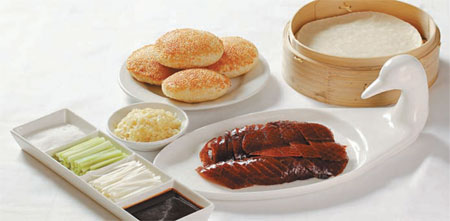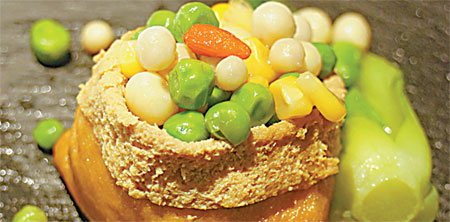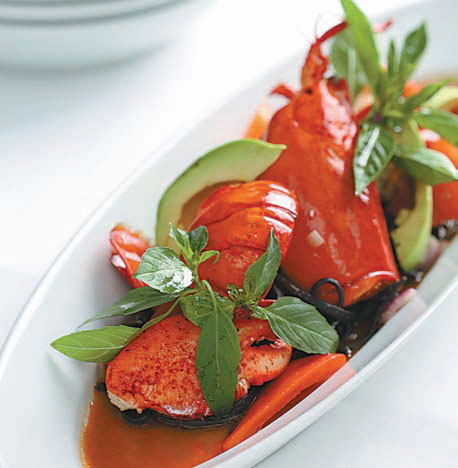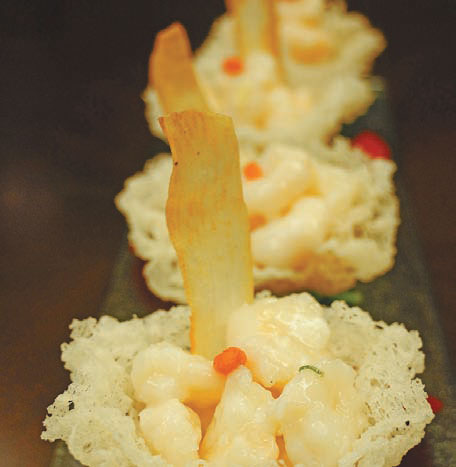Hidden dragons, crouching tigers
Updated: 2013-01-26 08:21
By Ye Jun (China Daily)
|
|||||||||||
|
Yuan Chaoying hopes to keep Peking roast duck's taste traditional and unchanged. |
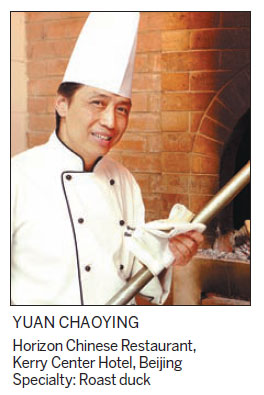
Among the vast number of restaurant kitchens in Beijing, there are many that merit both diner devotion and media attention. But, as Ye Jun points out, there are also the quiet achievers who are slowly making a name for themselves through steady hard work and outstanding quality. China Daily blows their covers.
Chef Yuan Chaoying insists there is no secret behind his great-tasting Peking roast ducks.
"If there is anything, use good ingredients and follow each step correctly," he says.
Yuan, a Beijinger, was executive chef of the legendary Ya Yuan, tucked away in a 3-star State-run hotel. Its roast duck had attracted the rich in Beijing and even dedicated diners from Hong Kong and Macao.
Before that, Yuan had worked as a chef for 23 years at Quanjude Peking Roast Duck's Hepingmen branch.
His roast duck pedigree is impeccable and Yuan has set his own standards. His ducks must be roasted to a dark date-red glaze, he says, a color that he thinks is most attractive.
Not only that, but the duck presented at his tables come only from the leg and the breast, in precise slices.
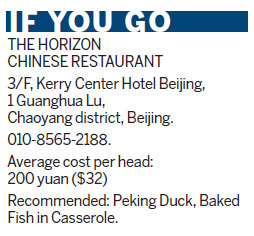
He deliberately offers these so diners can experience the different textures - the tenderness of the breast meat, and the more textured dark meat from the leg.
Yuan's Peking duck is outstanding, and the devil is in the details. He roasts his birds for about 60 minutes, more than the usual 45 minutes in other kitchens. This renders the fat beneath the skin, and the flavor is infused into the crisp coating while the meat becomes meltingly tender.
The pancakes used to wrap the duck are transparent but resilient enough to still have a bit of a bite to them. Even the dips are just a little different coming out from Yuan's kitchen.
Apart from the usual sweet sauce that is served, Yuan tries to persuade diners to try the duck slices dipped into sugar and garlic puree a slightly pungent but delicious alternative that also helps ease the grease.
The chef sources his ducks from the Jinxing farm, just like the other top duck eateries in the capital. The only difference, he says, is that he prepares fewer ducks in a day, sometimes only just 10 or a little more.
His ducks are available only if you call ahead.
Yuan uses the traditional Beijing jujube wood for his oven, a dense wood that keeps the fire burning long and steadily.
Yuan believes you should not meddle with the traditional recipe too much because "there is a reason why it has been preserved and passed down hundreds of years".
Yuan, 54, walks around his restaurant every day to greet customers, and says a chef's biggest asset, apart from his cooking talent and skill, is connections he accumulates.
Many of his celebrity customers come especially for him and if he is not in that day, they would come back again.
There have been invitations to work overseas, but Yuan had declined all.
"Roast duck is a Beijing thing, my root is here. If it leaves Beijing the taste will change. Here I can keep it traditional and unchanged," he says.
|
Zhao Bin's signature dishes include green peas and fox nuts in a bean curd pocket. Ye Jun / China Daily |
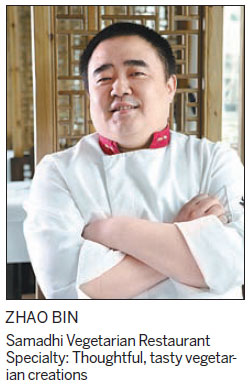
When Samadhi opened a few years ago, people marveled at the beautifully presented vegetarian dishes, but were skeptical if these would find a market in a mainly carnivorous town.
Vegetarian restaurants in Beijing were mostly in the mid to economical ranges, offering "mock meat" dishes created from soybean products or konjak.
In contrast, Samadhi celebrates natural ingredients with no pretenses that they are what they are, and it has attracted a faithful clientele with its tasty, healthy food and comfortable, classy decor.
There is now a long line waiting to get in and the tables are full every day. Chef Zhao Bin attributes the success of his restaurant to a general concern over health and food safety, and rising appreciation of ambience and good service, all of which are Samadhi's strong points.
Zhao Bin is getting well known in Beijing for his beautifully designed and tasty vegetarian dishes.
The chef has worked in major hotels, in both Chinese and Western kitchens. Last year, he found added fame when he appeared in the blockbuster CCTV documentary A Bite of China, showing off a bean curd creation gilded by a green pureed spinach, and topped with mushrooms.
Another signature dish is a soup with a bean curd skillfully shaped into a blooming chrysanthemum.
Traditionally, Chinese cuisine has many classic vegetarian dishes which had been all but forgotten. Fortunately, Zhao has revived many and added them to Samadhi's menu.
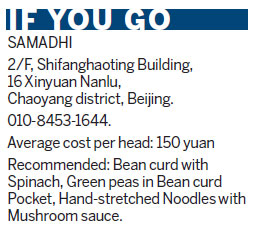
Recently, the restaurant cooperated with a magazine in Taiwan to present an "Eight Water Sprites" banquet featuring dishes made of water chestnut, fox nut, water caltrop, water asparagus, water shield, arrowhead, lotus and watercress.
These are mostly classic Chinese ingredients produced from aquatic plants, but to create something tasty and new from these demand experience and a thinking mind. This was where Zhao showed his mettle.
He hid discs of water chestnut in a covering of soft hawthorn jelly, creating contrast in both taste and texture. Water caltrop is simply boiled to retain its original taste while water asparagus is shredded and fried, and fox nuts are paired with fresh corn kernels.
Everything was lightly seasoned, to retain the original flavors.
Water shield is prepared as it is traditionally made, in soup. But the chef pairs it with bamboo fungus, a porous mushroom that again provides tactile contrast.
Arrowhead was deep-fried to make a very good crisp and also stewed for a soft, smooth texture. The last dish was the chef's signature dish of green peas and fox nuts wrapped in a bean curd pocket and the meal ended with a gratifying bowl of hand-stretched noodles with mushroom and black fungus sauce.
With chefs like Zhao Bin leading the way, Beijing's vegetarians can have much to look forward to.
|
Aw Yong's dish of spiced squid ink linguini with Boston lobster and red peppers demonstrates his expertise. |
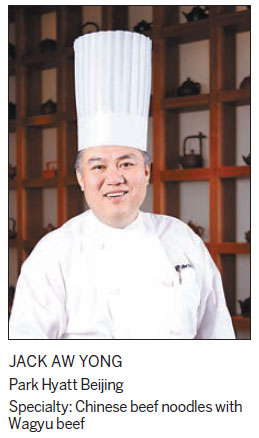
Jack Aw Yong has never had time to eat in another Chinese restaurant in Beijing rather than his own outlets. The Singaporean executive chef of the Park Hyatt Beijing has been here since 2007, when he came to prepare for the hotel's opening.
Since then, he has built a formidable reputation among Beijing's gourmets, creating a few landmark dishes that are copied to this day by other chefs - high accolades in a city of foodies.
He was the first to prepare braised pork belly with black truffles in a clay pot, a dish now conscientiously imitated by high-end Chinese restaurants in Beijing.
His Private Room Chinese Restaurant was known for its creative new dishes, such as dumplings with black truffle and a range of delicious zongzi, the little baby pyramids of rice and fillings.
Aw Yong likes to exercise traditional ideas with the best ingredients, and recently on the Park Hyatt's 63rd floor, he presented classic Chinese beef noodle using the best Wagyu beef. His version of this northwestern pasta specialty is a bit pricey at 130 yuan ($21) plus surcharges, but it is certainly a cut above the average beef noodle in the capital and would satisfy the most discerning lover of beef.
The expertise of Aw Yong and his team was showcased at a recent media event, where they created four giant ice-carvings of snakes for use as wine coolers and to chill champagne and caviar.
A dazzling starter platter included beautifully presented seafood, meats and vegetables, including lobster, goose liver mousse, and oolong tea smoked duck breast.
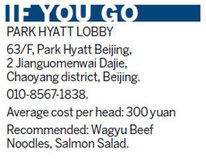
Bird's nest was used together with Iberico ham in a consomme served in a wax gourd carved with a Chinese poem, And even the butter had been whipped with truffles for a smooth, aromatic spread.
Chef Aw Yong has raised the bar for food presentation and standards, and we wait to see what he will do to challenge himself next.
At Lunar 8, Fairmont Beijing, Chef Yang Zhan-sheng takes pride that you can have a miniature culinary tour of China right at the table.
When he first became a chef, he worked as an intern at Quanjude Peking Roast Duck Restaurant, but he later worked at international hotels in Beijing and in South China, absorbing cuisine styles from all over the world.
"A chef needs to keep in touch with the times," says Yang, 40. "Cuisine styles develop in tandem with the economy. The Chinese are richer than before, and they are more particular about what they eat. A chef needs to be able to guide them."
He says China had distinctly different regional cuisines because it was more difficult to move around, but now that the infrastructure is so sophisticated, more and more restaurants are serving up a fusion of styles.
There is also the influence from Western cuisine, seen in more salad offerings and the beautiful presentations of desserts.
Yang defines what he offers as "creative new Chinese food", but there is also his excellent Peking roast duck.
His food philosophy is reflected in what he has to offer for that special dinner of the eve of the Spring Festival.
One of the highlights will be a bacon roll stuffed with Chinese glutinous rice, and paired with tender tofu. Another dish will be yellow croaker sealed in salt and flour, and baked. Just before serving, it is doused in liquor and set alight for a spectacular display at table.
Then there are dishes that shows off precise kitchen craft, such as the carefully sliced pork belly stacked into a pyramid and served with mushroom and cabbage.
Every dish on Yang's New Year menu is given an auspicious name to usher in good luck for the whole year. The set also includes his signature Peking roast duck, served in three plates: skin, meat and skin with meat. The carcass is boiled into a soup with nutritious Chinese herbs in it. The set also comes with a salad and a duck spring roll.
|
Yang Zhansheng injects innovation into Chinese food in such dishes as the signature river shrimp. Photos by Ye Jun / China Daily |
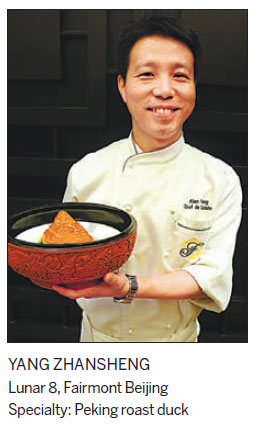
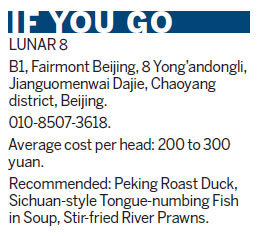
(China Daily 01/26/2013 page12)
Today's Top News
Police continue manhunt for 2nd bombing suspect
H7N9 flu transmission studied
8% growth predicted for Q2
Nuke reactor gets foreign contract
First couple on Time's list of most influential
'Green' awareness levels drop in Beijing
Palace Museum spruces up
Trading channels 'need to broaden'
Hot Topics
Lunar probe , China growth forecasts, Emission rules get tougher, China seen through 'colored lens', International board,
Editor's Picks

|

|

|

|

|

|
